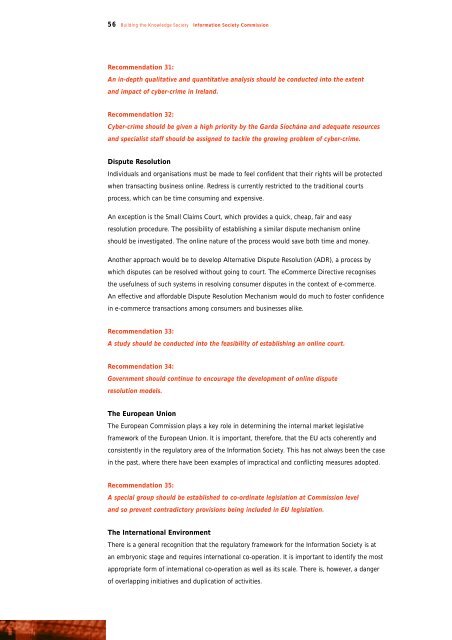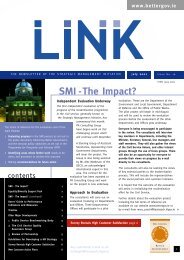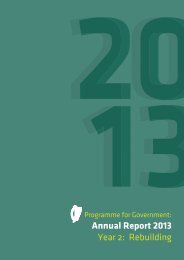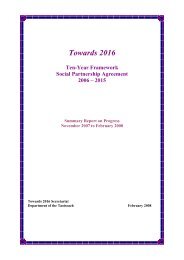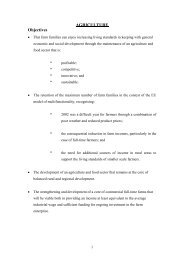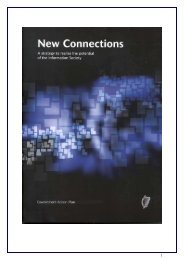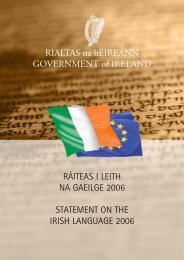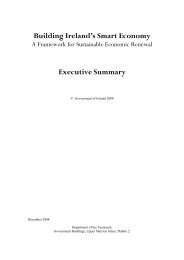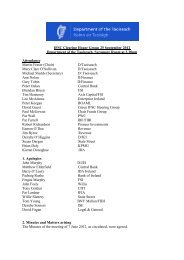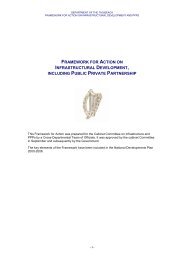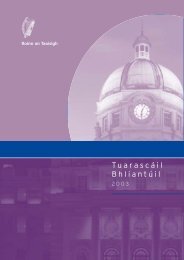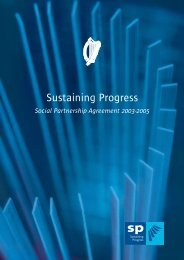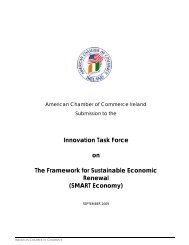Building the Knowledge Society - Department of Communications ...
Building the Knowledge Society - Department of Communications ...
Building the Knowledge Society - Department of Communications ...
You also want an ePaper? Increase the reach of your titles
YUMPU automatically turns print PDFs into web optimized ePapers that Google loves.
56 <strong>Building</strong> <strong>the</strong> <strong>Knowledge</strong> <strong>Society</strong> Information <strong>Society</strong> CommissionRecommendation 31:An in-depth qualitative and quantitative analysis should be conducted into <strong>the</strong> extentand impact <strong>of</strong> cyber-crime in Ireland.Recommendation 32:Cyber-crime should be given a high priority by <strong>the</strong> Garda Síochána and adequate resourcesand specialist staff should be assigned to tackle <strong>the</strong> growing problem <strong>of</strong> cyber-crime.Dispute ResolutionIndividuals and organisations must be made to feel confident that <strong>the</strong>ir rights will be protectedwhen transacting business online. Redress is currently restricted to <strong>the</strong> traditional courtsprocess, which can be time consuming and expensive.An exception is <strong>the</strong> Small Claims Court, which provides a quick, cheap, fair and easyresolution procedure. The possibility <strong>of</strong> establishing a similar dispute mechanism onlineshould be investigated. The online nature <strong>of</strong> <strong>the</strong> process would save both time and money.Ano<strong>the</strong>r approach would be to develop Alternative Dispute Resolution (ADR), a process bywhich disputes can be resolved without going to court. The eCommerce Directive recognises<strong>the</strong> usefulness <strong>of</strong> such systems in resolving consumer disputes in <strong>the</strong> context <strong>of</strong> e-commerce.An effective and affordable Dispute Resolution Mechanism would do much to foster confidencein e-commerce transactions among consumers and businesses alike.Recommendation 33:A study should be conducted into <strong>the</strong> feasibility <strong>of</strong> establishing an online court.Recommendation 34:Government should continue to encourage <strong>the</strong> development <strong>of</strong> online disputeresolution models.The European UnionThe European Commission plays a key role in determining <strong>the</strong> internal market legislativeframework <strong>of</strong> <strong>the</strong> European Union. It is important, <strong>the</strong>refore, that <strong>the</strong> EU acts coherently andconsistently in <strong>the</strong> regulatory area <strong>of</strong> <strong>the</strong> Information <strong>Society</strong>. This has not always been <strong>the</strong> casein <strong>the</strong> past, where <strong>the</strong>re have been examples <strong>of</strong> impractical and conflicting measures adopted.Recommendation 35:A special group should be established to co-ordinate legislation at Commission leveland so prevent contradictory provisions being included in EU legislation.The International EnvironmentThere is a general recognition that <strong>the</strong> regulatory framework for <strong>the</strong> Information <strong>Society</strong> is atan embryonic stage and requires international co-operation. It is important to identify <strong>the</strong> mostappropriate form <strong>of</strong> international co-operation as well as its scale. There is, however, a danger<strong>of</strong> overlapping initiatives and duplication <strong>of</strong> activities.


